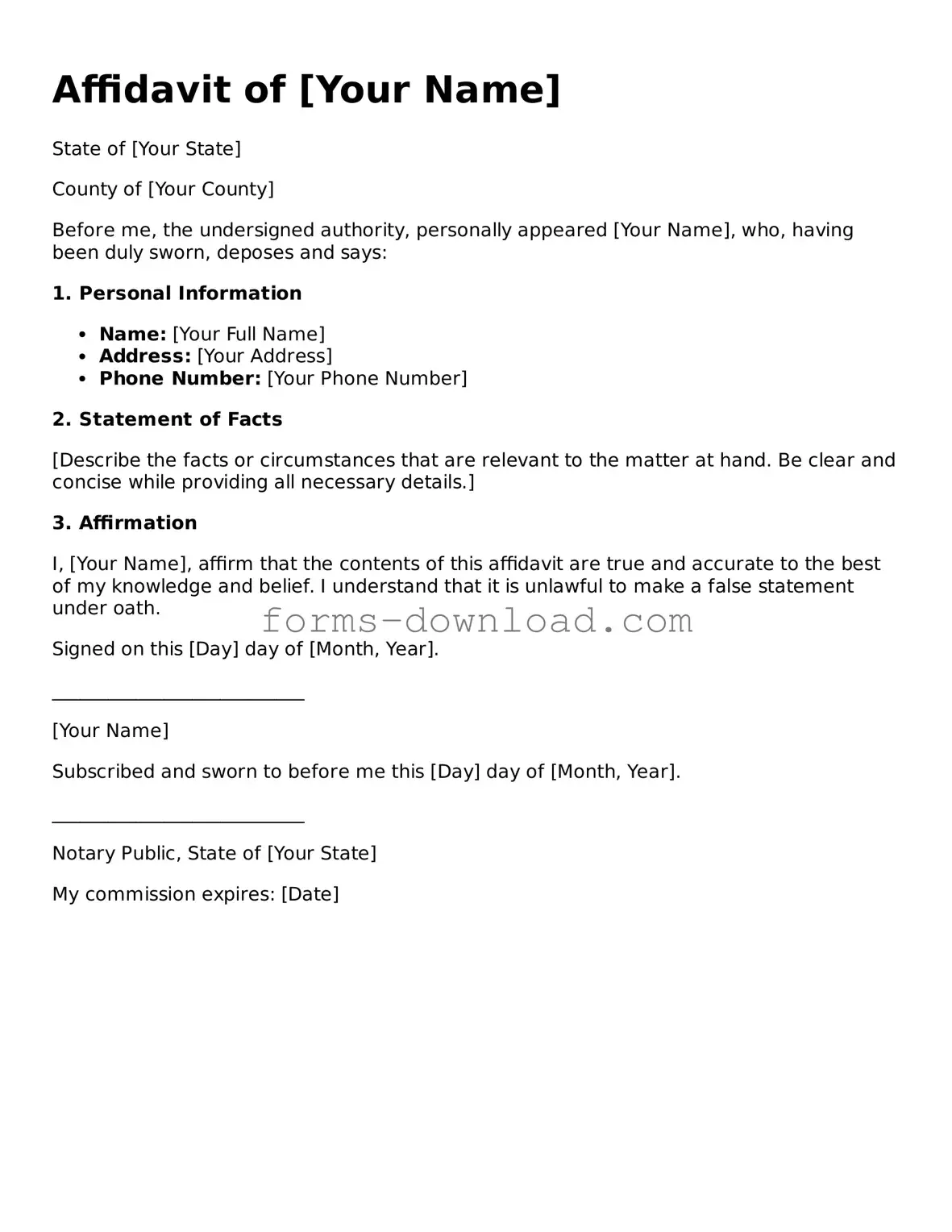Fillable Affidavit Form
The Affidavit form serves as a crucial legal document that individuals may use in various situations, such as court proceedings, administrative matters, or personal transactions. It allows a person to present their statements or facts under oath, ensuring that the information provided is truthful and can be relied upon. Typically, an affidavit includes details such as the affiant's name, address, and a declaration of the facts they are attesting to. This form often requires the affiant's signature, along with the date and a notary public's acknowledgment, which adds an extra layer of authenticity. Affidavits can be used for a wide range of purposes, including but not limited to, proving identity, establishing residency, or supporting claims in legal disputes. Understanding how to properly complete and utilize an affidavit is essential for anyone needing to convey important information in a formal and legally recognized manner.
Popular Forms:
Alabama Title Application Mvt 20-1 - A $15 application processing fee is required for submission, payable in certified funds.
In order to facilitate the ownership transfer process, it is important to utilize the appropriate documentation, such as the Bill of Sale for a Boat, which outlines all necessary transaction details clearly and effectively.
Free Operating Agreement for Single Member Llc - This document ensures compliance with state laws regarding LLCs.
Waiver of Liability Form - This form protects against claims from accidents after a vehicle release.
Dos and Don'ts
When filling out an Affidavit form, it is important to follow certain guidelines to ensure the document is completed correctly. Here are some key dos and don'ts:
- Do read the instructions carefully before starting to fill out the form.
- Do provide accurate and truthful information to the best of your knowledge.
- Do sign the affidavit in the presence of a notary public if required.
- Do keep a copy of the completed affidavit for your records.
- Don't leave any required fields blank; ensure all necessary information is provided.
- Don't use unclear or ambiguous language; be straightforward in your statements.
- Don't sign the affidavit without verifying that all information is correct.
- Don't submit the affidavit without checking for any errors or omissions.
Affidavit Sample
Affidavit of [Your Name]
State of [Your State]
County of [Your County]
Before me, the undersigned authority, personally appeared [Your Name], who, having been duly sworn, deposes and says:
1. Personal Information
- Name: [Your Full Name]
- Address: [Your Address]
- Phone Number: [Your Phone Number]
2. Statement of Facts
[Describe the facts or circumstances that are relevant to the matter at hand. Be clear and concise while providing all necessary details.]
3. Affirmation
I, [Your Name], affirm that the contents of this affidavit are true and accurate to the best of my knowledge and belief. I understand that it is unlawful to make a false statement under oath.
Signed on this [Day] day of [Month, Year].
___________________________
[Your Name]
Subscribed and sworn to before me this [Day] day of [Month, Year].
___________________________
Notary Public, State of [Your State]
My commission expires: [Date]
Listed Questions and Answers
-
What is an affidavit?
An affidavit is a written statement that is confirmed by the oath or affirmation of the person making it. This document is often used in legal proceedings to provide evidence or support for a claim. Essentially, it serves as a way for individuals to present facts in a formal manner, under the penalty of perjury, meaning that the person swears the information is true to the best of their knowledge.
-
When is an affidavit necessary?
Affidavits are commonly required in various situations. For example, they may be needed in court cases, such as divorce proceedings or child custody disputes, where a party must provide evidence regarding their claims. Additionally, they can be used in real estate transactions to affirm the ownership of property or in financial matters to verify income or assets. If you are unsure whether an affidavit is necessary for your situation, consulting with a legal professional can provide clarity.
-
How do I create an affidavit?
Creating an affidavit involves several steps. First, clearly outline the facts you wish to include, ensuring they are relevant to your case. Next, format the document properly, including a title that states it is an affidavit, your name, and a statement of the facts. After that, you must sign the affidavit in the presence of a notary public, who will also sign and stamp the document to validate it. It's essential to be honest and precise, as any false statements can lead to serious legal consequences.
-
Can I use a template for my affidavit?
Yes, using a template can be a helpful starting point for drafting your affidavit. Many templates are available online, providing a structure that you can customize with your specific information. However, it is crucial to ensure that the template complies with the legal requirements of your state or jurisdiction. Tailoring the affidavit to your unique situation is essential, and seeking guidance from a legal expert can help ensure that your document meets all necessary standards.
PDF Characteristics
| Fact Name | Description |
|---|---|
| Definition | An affidavit is a written statement confirmed by oath or affirmation, used as evidence in court. |
| Purpose | Affidavits serve to provide a sworn statement of facts to support legal proceedings or claims. |
| State-Specific Forms | Each state may have its own affidavit forms. For example, California governs affidavits under the California Evidence Code. |
| Notarization Requirement | Most jurisdictions require affidavits to be notarized to ensure authenticity and compliance with legal standards. |
